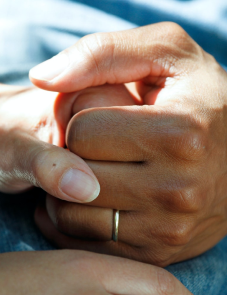Whether it was expected or not, dealing with a death is always a stressful experience. Life Ledger can help you simplify the death notification process, but that is only one of many practicalities that need to be addressed. Below we have compiled a list of actions, some advice and resources which we hope will be of use.

WHAT HAPPENS WHEN SOMEONE DIES AT HOME?
Just over 20 percent of deaths in the UK occur in people’s own homes. Although the exact process will depend on whether the death was expected, notifying the relevant authorities of a passing is not complex and should be carried out promptly.
Call the GP: If the death is expected, you should contact either the deceased’s GP or a nearby doctor. If the cause of death is known and from natural causes, the GP will issue documents to you that will allow you to register the death.
Dial the emergency services: If the death is unexpected, you should dial 999 and ask both for an ambulance and for the police. The emergency services operator will guide you the immediate process and will establish whether resuscitation may be possible.
Transfer the body: If the cause of death is not known, the police will arrange for the body to be moved by a funeral director acting for the coroner. If the cause of death is known and of natural causes, you should arrange movement with a funeral director of your own choice.
Donate tissues: While organ transplants are largely impossible when a person has died outside of a hospital, donation of tissues remains a possibility. Tell the GP and the funeral director if this was a wish of the deceased as it may be necessary to move the body to a hospital.
Cleaning: If you would like to have the area in which the deceased spent their final days cleaned, there are specialist companies that will offer a discreet yet comprehensive service.
WHAT HAPPENS WHEN SOMEONE DIES AT HOSPITAL?
The majority of deaths in the UK occur in hospitals and care homes. When a loved one dies, the hospital, care home or hospice will notify the next of kin or closest family members promptly. Many hospitals and homes in the UK have staff specialising in transitioning from the hospital to the funeral home.
Collect a medical certificate: If the cause of death is known, a doctor at the hospital will usually issue a Medical Certificate of Cause of Death. If the language of the Certificate contains medical jargon you don’t understand, ask the doctor to clarify.
Post-mortem examination: If the doctor is unsure of the cause of death, even if the death was clearly from natural causes, they will contact the coroner, who may then order a post-mortem examination to determine the cause of death.
Transfer the body: After a person dies in hospital, their body will be kept in the hospital mortuary. You can arrange for your chosen funeral director to collect them, be aware that you may need to sign an authorisation form to enable the funeral director to collect the deceased.
Collect possessions: The deceased’s possessions will be kept secure by the hospital until a family member or the executor of the deceased’s estate arranges for them to be collected. They will need to be signed for when collected. Be sure to inform the executor if the deceased had items with them in the hospital.
Donate organs: If you are unsure, the hospital can confirm whether the deceased is an organ donor. The hospital might also ask to confirm that the deceased did not change their mind about donating organs before their passing.
HOW DO YOU REGISTER A DEATH?
After an individual has died, you need to register their death with the government in order to arrange a funeral and to deal with the deceased’s estate. A formal record of the deceased’s death and the issuance of a death certificate will allow you to close the deceased’s accounts and have their will administered.
Register a death on time: If you live in England, Wales, or Northern Ireland, you have up to five days to register a death; if you live in Scotland, you have up to eight.
Make sure you are eligible to register: Any close relative can register the death. However, if a close relative cannot be found, any relative (including in-laws), an individual who was with the deceased when they died, any person who shared the address of the deceased, or the individual arranging the funeral (but not the director), can register the death.
Find a registry office: You will need to register the death at a government registry office, typically, the registry office closest to the location where the deceased died is used. However, you can register the death at any office you choose, but the processing will take longer. There are just over 75 registry offices in England and Wales.
Have the necessary information to hand: You will need the Medical Certificate of Cause of Death to register a death. In addition, it is helpful to have the deceased’s identification and proof of address to hand. The government has a full list of information you will be expected to provide.
Keep hold of the paperwork: After registration, the registrar will give you a number of documents these are: a certificate for burial or cremation, a certificate of registration of death, and copies of the death certificate.
HOW DO YOU PLAN A FUNERAL?
Whether planned in advance, or organised after the death, a funeral is always an emotional challenge. Although the personal intricacies that can be added are pretty much limitless, the process itself is relatively straight forward.
Pre-arrangements: First, you should consult the deceased’s will, and see if they requested any specific arrangements, such as choice of funeral director, location of ceremony, music to be played or poems to be read. Really importantly, check to see if they have pre-paid for their funeral by taking out a funeral plan.
Funeral director: If the deceased has not specified a director, you will need to organise one. It is good to have a rough idea of the ceremony you would like conducted when searching, to make sure the funeral director can provide that service.
Prepare for the first meeting: Here you can plan the broad outline of not just the funeral service, but the logistics before and afterwards. At the meeting, you will arrange for the body to be collected, discuss whether the body will be buried or cremated and talk around options for the ceremony. Most funeral directors will come to you if prefer, so you can talk in the comfort of your own home.
Create an order of service: For many the order of service will be a memento of the deceased that will be kept for a long time. Think about a tone you feel reflects the deceased and about what you might put on it (photographs, favourite poems, a quote).
Add personal detail: A cardboard coffin or gold-plated urn, flowers or photographs, mourning suits, or fancy dress. The options for personalising a ceremony are as varied as the individuals we celebrate and help to reflect the unique personality of the deceased.
WHAT ARE THE DIFFERENT FUNERAL OPTIONS?
While cemetery burial and cremation remain first choice for many, there are an increasing number of alternatives available. each offering a unique ambience for celebrating and reflecting upon the life of the deceased.
Cemetery burial: At the cemetery burial, friends and loved ones gather round the coffin as it is lowered into the ground. Before burial, you will need to secure a burial plot application, usually issued by a local council or cemetery. The right of burial is typically purchased for 75 years.
Natural burial: Increasing in popularity with over 360 sites across the UK offering a more eco conscious alternative. Natural burials use a biodegradable coffin or shroud, and the body isn’t embalmed. Most graves are unmarked, but some have a tree planted or are sown with wildflowers.
Cremation: Cremation is now the most common form of funeral service in the UK. If opting for a cremation, secure a cremation certificate when you register the death. You can choose to have the ashes of the deceased scattered in the crematorium Garden of Remembrance or you may take them with you.
Burial at sea: Burial at sea isn’t common but it is possible with correctly constructed coffin and a licence. In English waters, there are three designated coastal burial sites: Newhaven in East Sussex, the Needles Spoil Ground near the Isle of Wight, and Tynemouth. Scattering ashes in the sea doesn’t require a licence or permission.
Humanist: Humanist services are ideal for those who wanted their funeral separated from religious influence. The ceremony tends to be more informal and flexible than a funeral service and are usually led by a humanist celebrant. They may be held anywhere.
WHO DO YOU NEED TO TELL ABOUT A DEATH?
You will need to inform all organisations, in both the public and commercial sector, that the deceased was connected to. This might be to cancel direct debits, transfer accounts or ensure continuity of supply to a surviving partner.
The public sector: The UK government Tell Us Once service enables you to report a death to most government offices from one place at the same time. Departments such as HMRC, DWP, NI and the DVLA.
The local authority: Contact the local council to remove the deceased from the electoral register and cancel any benefits that they were receiving. As with government departments this can be done through the Tell Us Once service.
Commercial companies: Everyone from water and gas suppliers to banks, pensions, credit and store cards will need to be contacted and notified of the death. Life Ledger can be used for this in the same way as Tell Us Once is used for the public sector.
Junk mail: Not only wasteful but often a painful reminder, junk mail can continue for many months after a death. of their passing. Registering with the Mailing Preference Service helps stop unsolicited mail.
Digital legacy: With the advent of digital services, many persons leave a legacy online as well as in person. Online providers, such as Google and Facebook, have services to permanently close the deceased’s accounts.
WHAT IS PROBATE?
A ‘grant of probate’ is a legal document that gives you the legal right to deal with the estate of the deceased (property, money and possessions). Probate is needed in most but not all cases more information can be found at www.gov.uk
Apply for a Grant of Probate: If the deceased left a will, you should formally apply for a grant of probate; if not, apply for letters of administration. Typically, it takes between nine and 12 months to obtain the grant of probate/letters. You can apply online or by post.
Contact asset holders: To release the deceased’s assets, their property, money and possessions, you will need to send a copy of the grant of probate to each asset-holders. Assets will be released to the executor of the will, or to the administrator of the estate.
Calculate inheritance tax due: Currently, the inheritance tax threshold is £325,000. Estates valued at or under this sum will not need to pay any tax. Estates will need to pay 40% standard inheritance tax for any value in excess of £325,000.
Place statutory advertisements: By placing a statutory advertisement, you can avoid potential liability for debts owed by the deceased to creditors following the distribution of the estate. You can place an advertisement in The Gazette and also a paper local to the deceased.
Consider assistance: While it is possible to administer an estate single-handedly, it can be a time-consuming process. Many people choose to appoint an estate administration specialist, these can either be dedicated probate firms, or your local solicitors.





